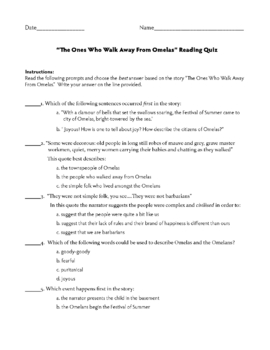

Collins compares this to the way Jesus suffered and died, only to rise again to a transformed, glorious life. This helps the conscience of the ones who could not stay if the child remained incarcerated, but does nothing for the child.Īnother way LeGuin's story reflects theology is by the way the child must suffer for others happiness. opefully the guilt for the child's suffering will go away, just like the people did. The Omelas people know that if the child were released, then the possible happiness of the degraded child would be set against the sure failure of the happiness of many. The city's great happiness, is splendors and health, its architectural, music, and science, all are dependent upon the misery of this one child. If the child were rescued from its cell, the whole city of Omelas would falter. The reader later finds out that all Omelas' happiness and joy depend on a child who is locked in a cellar. While the narrator is saying all that Omelas has and does not have, she says "One thing I know there is none of in Omelas is guilt"(877). "Omelas sounds in my words like a city in a fairy tale, long ago and far away, once upon a time"(LeGuin 876). With the help of the reader, the narrator makes Omelas appealing to everyone. Can the narrator be trusted by a reader who is being asked to approve the details of the story? Such questions raise doubts in the reader's mind about what the narrator is conveying. The narrator also asks the readers "Now do you believe in them?"(879) Asking if the reader believes what the narrator says about the festival, city, and joy of the people of Omelas implies that the reader should have doubts. Now the reader might feel that the city is fictious. The method of letting the reader make the city the way he choose makes the city more desirable by him" Perhaps it would be best if you imagined it as your own fancy bids, assuming it will rise to the occasion, for certainly I cannot suit you all"(LeGuin 876).

The narrator states the technology Omelas could have and then says "or they could have none of that: it doesn't matter. The narrator also lets the reader mold the city. At times the narrator does not know the truth and therefore guesses what could be, presenting these guesses as often essential detail. Omelas is described by the narrator as the story begins. "The Ones Who Walk Away From Omelas" presents a challenge of conscience for anyone who chooses to live in Omelas.

In Ursula LeGuin's short story "The Ones Who Walk Away From Omelas" the city of Omelas is described as a utopia. Utopia is any state, condition, or place of ideal perfection. The use of rhetorical questions instead of simple assertions by the author makes the reader wonder why the narrator is so desperate to convince them of Omelas.Ursula LeGuin's The Ones Who Walk Away From Omelas

For instance, “Do you believe? Do you accept the festival, the city, the joy?”(177) and “I wish I could describe it better. Omelas can be truly called a ‘utopia.’ through its cosmetic natural beauty and the content …show more content… The text is interspersed with the narrators’ queries on whether the reader has been sold on the city of Omelas. Even vivid imagery such as pastry crumbs on grey beards give a feeling of underlying contentment to the people. This tone is established through synaesthesia such as “white-gold fire across the.air”(LeGuin,175) or the “cheerful …sweetness of the air”(175). In the first half of this work, the narrator outlines the fulfilling, content nature of Omelas. The narrator portrays Omelas as a pertinent concept rather than a real place by making the reader doubt the utopian nature of Omelas. The narrator makes us cognizant of how our own happiness comes at the price of someone else’s happiness, much like in Omelas. But, in exchange for all of this, one child must be locked away in abject misery. The city of Omelas has joyful processions, perfect harvests, and healthy children. This ignorance of ones privilege, present in my date and in most first-world citizens, is what the narrator masterfully brings out in“The Ones Who Walk Away From Omelas” by Ursula K. I told him how the child in China who made his phone was poor and abused, he wasn’t. My date brandished his new iPhone and told me how being poor is hard on him. Show More First one problems and privilege and the illusion I had my first first-date at Valley Fair Mall last week.


 0 kommentar(er)
0 kommentar(er)
